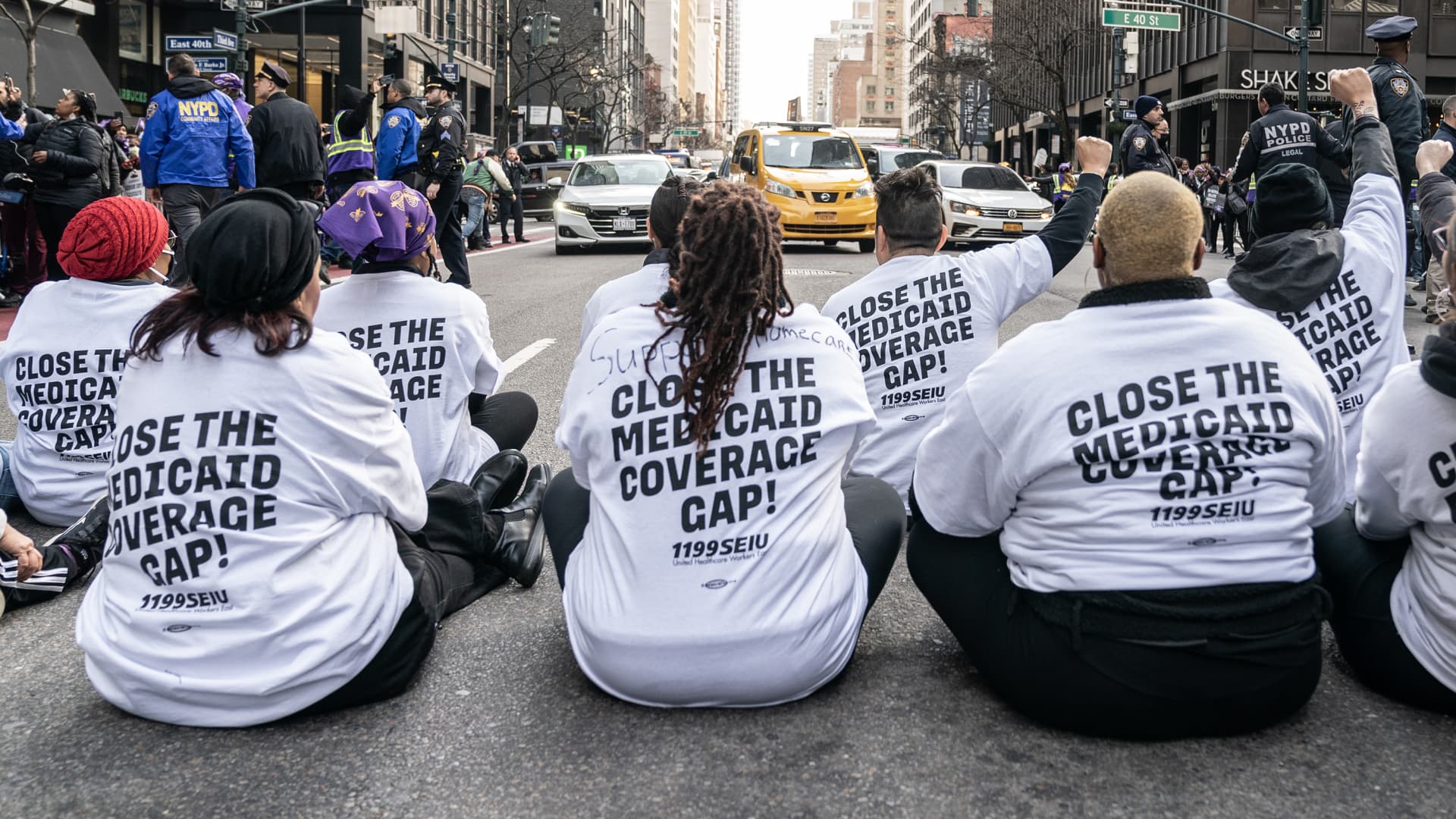
Hundreds of 1199SEIU health care workers staged a rally and sit to block 3rd avenue where some were arrested. They protested against health care cuts in Governor Kathy Hochuls budget on Medicare.
Lev Radin | Lightrocket | Getty Images
U.S. states on Saturday will start to kick as many as 15 million people off Medicaid insurance, as an emergency safety net put in place during the Covid-19 pandemic comes to a gradual end.
Medicaid is the public health insurance program for people who have lower incomes. It is jointly administered by the state and federal governments.
Congress basically barred states from terminating Medicaid coverage during the pandemic through the Families First Coronavirus Response Act. The law passed in March 2020 provided a safety net for people as the first deadly wave of Covid swept the nation and lockdowns crippled the U.S. economy.
Medicaid coverage swelled to more than 85 million people as of December, a 25% increase from February 2020, before the requirements to keep people enrolled in the program took effect, according to data from the Health and Human Services Department.
But states can start kicking people off Medicaid on Saturday if they no longer meet the program’s pre-pandemic eligibility requirements, which are based mostly on income. Congress slipped a provision in federal spending legislation in December that allows states to start disenrolling people on April 1.
Although some states will start terminating coverage in April, others are waiting until May, June, July and October before they do so. A list of when all 50 states will start ending coverage is below.
Click here for a list of when states will have their first round Medicaid coverage terminations. The table was provided by the Kaiser Family Foundation.
States have up to a year to determine whether individuals are still eligible for Medicaid, and 14 months to complete the process of either renewing their coverage or kicking them off, according to HHS guidance documents.
HHS estimates that as many as 15 million people stand to lose coverage as the program returns to pre-pandemic eligibility requirements. Many of these individuals are expected to be eligible for other forms of health insurance.
The changes will disproportionately affect people of color and young people, according to HHS. About 30% of those who could lose Medicaid coverage are Hispanic, and 15% are Black. At the same time, more than 5 million children and 4.7 million adults ages 18 to 34 may get kicked off Medicaid, according to HHS.
An estimated 2.7 million people who could lose Medicaid coverage should qualify for tax credits under the Obamacare health insurance marketplaces. About 62% of those people are expected to be eligible for plans with no premiums. Another 5 million people are expected to be able to get other forms of coverage, primarily through their employer.
HHS has set up a special enrollment period at healthcare.gov to help people transition to Obamacare marketplace insurance if they lose Medicaid between March 31, 2023 through July, 31, 2024.
A majority of the states, 33 in total, use healthcare.gov as their insurance marketplace. The 17 states that manage their own marketplaces can offer this special enrollment period but are not required to do so.
As many as 6.8 million people could lose Medicaid even though they are still eligible for the program. Prior to the pandemic, people frequently lost coverage due to red tape. An individual could lose coverage if they didn’t complete the annual renewal process, or if their state was unable to contact them due to a change of address or other issues.
Under a provision Congress passed in December, states are required to make a good faith effort to contact people whose eligibility is under review through more than one communication method. In other words, a state can’t terminate someone’s coverage simply because outreach by mail was returned as undeliverable, which frequently happens due to an address change or other reasons.
HHS estimated in August 2022 that some 383,000 people who lose Medicaid as the pandemic expansion winds down will fall through a bureaucratic crack called the “coverage gap.”
This gap exists in 10 states that haven’t expanded Medicaid to include people whose income is up to 138% higher than the federal poverty level. As a consequence, some people in those states who struggle to make ends meet still do not qualify for Medicaid because the income eligibility requirements are set so low. Some of these individuals also do not qualify for Obamacare tax credits, leaving them with no affordable health insurance options.
Texas and Florida are the two most populous states that still haven’t expanded Medicaid.







